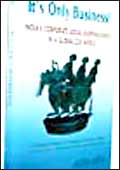 |
ANDY GROVE
Richard S. Tedlow
Penguin Portfolio
Pp: 568
Price: Rs 695 |
In the late 1950s, there were
thousands of penniless immigrants still pouring into the United
States from Europe. Many of them also moved to the west coast, which
was beginning to emerge as a centre for computing technology. But
only one man went on to become Andy Grove. He did not found Intel
(Gordon Moore and Robert Noyce did), but went on to become its most
famous employee (he offered to tag along when Moore told him he
was quitting Fairchild Semiconductor to start a new company). The
'how' of it is what preoccupies Richard Tedlow in his fascinating
biography of Grove, who drove Intel to dizzying success before stepping
down as the CEO in May, 1998.
No doubt, there's plenty already written about Intel and Grove,
but Tedlow, he says, did not set out to write a catch-all story
of the man. The Harvard Business School professor, who is clearly
smitten by Grove, decided to attempt a page-turner instead, built
around three key questions about the man: "I want to know
how he thinks"; "I want to know how all these decisions
really did get made"; "I want to know all the stuff
that he won't tell you about". Now, turning a biography into
a page-turner is a tall order for any writer, even if your subject
is Grove, but Tedlow manages admirably.
Part of that is due to the rich detail he is able to provide
about Grove and his times, starting with his family in Budapest,
where he was born in 1936, to his coming to America in 1957 and
his spectacular rise thereafter. The other part is, of course,
due to the happy trot at which Tedlow's narrative moves, and the
ease with which he is able to dissect Grove's personality. Here's
a sample: "Grove's impact lies not only in the fact that
he is both smart and relentless. It also resides in a certain
pattern that asserts itself when you get into an argument with
him. You can feel quite trapped. He not only argues, he seems
to be able to control the terms of the debate. You can feel yourself
being manoeuvred into agreeing with that he is right and you are
wrong. Once that point is reached, he becomes dismissive".
But as Intel's "floating point" disaster (only in
terms of public relations and financial write-offs) of 1994 proved,
even a brilliant CEO like Andy Grove has his blind spots. In this
case, it was his refusal to acknowledge the inconsequential flaw
in the Pentium chip as something that Intel's customers had a
right to get worked up over. Intel today is under pressure and
its market cap has dropped to about $122 billion from historical
highs four times higher, but Grove's reputation not just endures,
it grows. And it is to Tedlow's credit that he has been able to
add richly to a understanding of a phenomenon called Andy Grove.
 |
IT'S ONLY BUSINESS
By Meera Mitra
Oxford University Press
Pp: 192
Price: Rs 395 |
One of the things late management
guru Peter Drucker said of business was that in the 21st century,
profit-making would cease to be the sole raison d'etre of private
enterprises. Instead, the most successful corporations would be
those that are seen as being responsible to the communities in which
they operate. In a country like India, where the disparity between
the rich and the poor is embarrassingly stark, corporations have
a special responsibility to ensure that some of their profits flow
back directly to the society. Meera Mitra's book is, therefore,
not just timely, but a valuable addition to the growing body of
work in this area. Mitra, a development specialist and independent
consultant (also wife of FICCI's Secretary General, Amit Mitra),
begins her book by outlining the philosophical and political aspects
of corporate social responsibility (CSR), goes into the historical
origins of the concept, moves to current trends, and finally wraps
up with her suggestions on how to embed CSR in India. Corporations,
students and anyone else interested in CSR will find It's Only Business
"a valuable handbook", to borrow the words of Infosys
Technologies Chairman, N.R. Narayana Murthy. |






